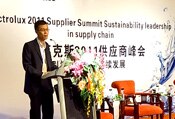As part of its Responsible Sourcing Program, Electrolux carries out annual Workplace Code of Conduct audits to check that suppliers are in alignment with the Group's social responsibility standards.
The proportion of procurement from low-cost regions increased from 30% in 2004 to approximately 60% (56) in 2011 and is expected to reach approximately 70% in a couple of years.
Acquisitions and investments are screened for their sustainability risk as part of due diligence. For an insight into how companies new to Electrolux such as the Olympic Group are successively aligned with Electrolux policies and requirements on human rights, see the case study
Human rights screening among suppliers
In total, 360 (328) audits were performed among suppliers this year, 327 (271) by Group sustainability auditors and 33 (57) by third-party assurers.
Audit findings conducted during 2011 indicate that health and safety issues continue to be prevalent. Since 2009, Electrolux has had stricter than legally mandated environmental requirements in its guidelines and monitoring, and environment has become the second largest area of non-compliance.
Follow-up audits were also carried out at 25 (16) suppliers in Europe, 31 (23) suppliers in Latin America and 27 (17) suppliers in Asia Pacific. Initial audits of the same suppliers were completed in 2010 and 2011.
As in 2010, the outcome of the audits indicates considerable improvement by most suppliers. Issues not yet solved are either minor or areas that will require long-term changes in current procedures. Other activities, such as training and practical consultation, are necessary to support further improvements among these suppliers.
The Responsible Sourcing Program has been a forerunner in applying a ‘beyond monitoring’ approach, by providing supplier training, through the Workplace Standard and by developing projects for specific, strategic suppliers.
Non-discrimination
Internally, human rights training for all unit heads take place as part of the Code of Conduct assessment. The first wave of Ethics at Electrolux program delivery is complete in Latin America (see case study SO2 Ethics for all) and it will be extended to every employee.
As the ethics program rolls out, any cases of discrimination declared via the Ethics Helpline and other channels will be logged and followed up.

